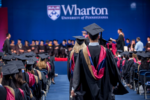Get the latest news & stories, innovative research, upcoming events, and more, from the ESG Initiative.
A Penn Undergraduate Pursues Passions for ESG and Environmental Justice

As a Turner ESG Senior Fellow and Research Assistant at the ESG Initiative, Penn Senior Marielle Kang engages with experts, works across diverse research projects, and mentors the next generation. Read More
We Don’t See What Climate Change Is Doing to Us

(Outlet: The New York Times) Wharton Climate Center Affiliated Scholar R. Jisung Park writes about how we don’t see what climate change is doing to us, and the changes we must make to our social and economic systems to survive the escalating warming. Read More
11 Social Impact Leaders Receiving Loan Forgiveness Awards in 2024

The ESG Initiative is pleased to announce the 2024 recipients of the John M. Bendheim Loan Forgiveness Fund for Public Service. Read More
Knowledge at Wharton
Research and Insights
Get Involved
Get the latest ESG Initiative news, stories from Wharton and Penn, innovative research, podcasts, upcoming events, and more.


